



How Long Do Dental Implants Last
Rockwest Dental Clinic Mississauga • July 15, 2024
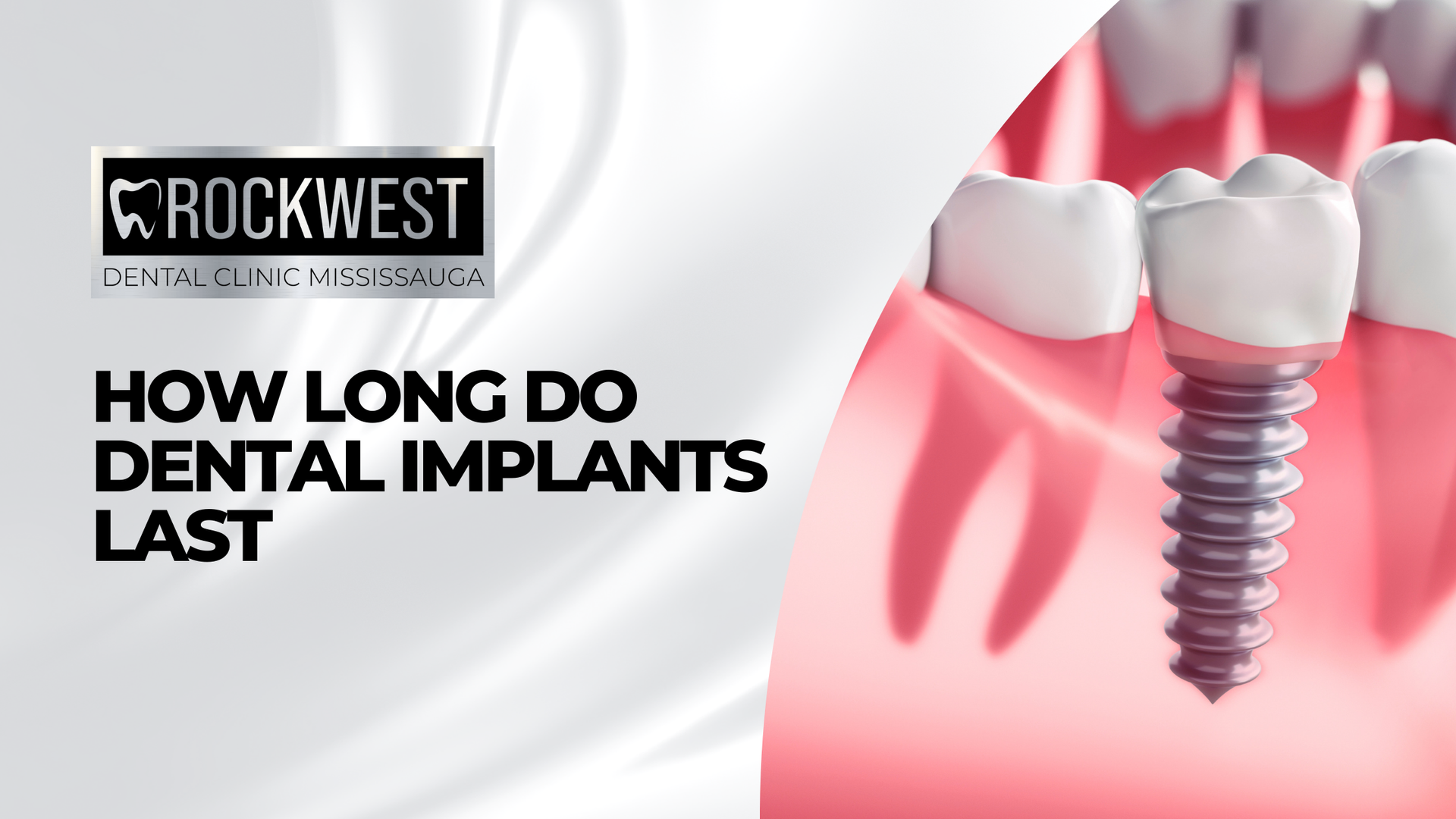
Source: Dr. Marketing
Dental implants are artificial tooth roots made of titanium or other biocompatible materials, surgically placed into the jawbone to support a replacement tooth or bridge. These offer a permanent solution for missing teeth, providing stability and functionality similar to natural teeth. Understanding the longevity of dental implants helps set realistic expectations, emphasizing the need for proper care while making informed decisions about dental investments and ensuring long-term satisfaction and oral health.
Studies spanning over 30 years show dental implants have a high survival rate1. Specifically, these studies report a cumulative survival rate of 97.1% after more than 25 years. This data strongly indicates the long-lasting durability of dental implants.
Average Lifespan of Dental Implants

Dental implants are renowned for their durability and longevity, making them a preferred choice for tooth replacement. While they may last a lifetime for some people, on average, dental implants can last 25 years or longer with proper care and maintenance. This impressive lifespan significantly outperforms most other dental restoration options. Dentures typically last about 7-10 years before needing replacement, and bridges may last around 10-15 years. The longer lifespan of dental implants is largely due to their design, which integrates directly with the jawbone, providing a stable and permanent foundation for the artificial tooth.
Before proceeding into the specifics of the multifactorial problems that can influence how long the dental implants last, one should understand what a dental implant (or tooth implant) is.
What Are Dental Implants?
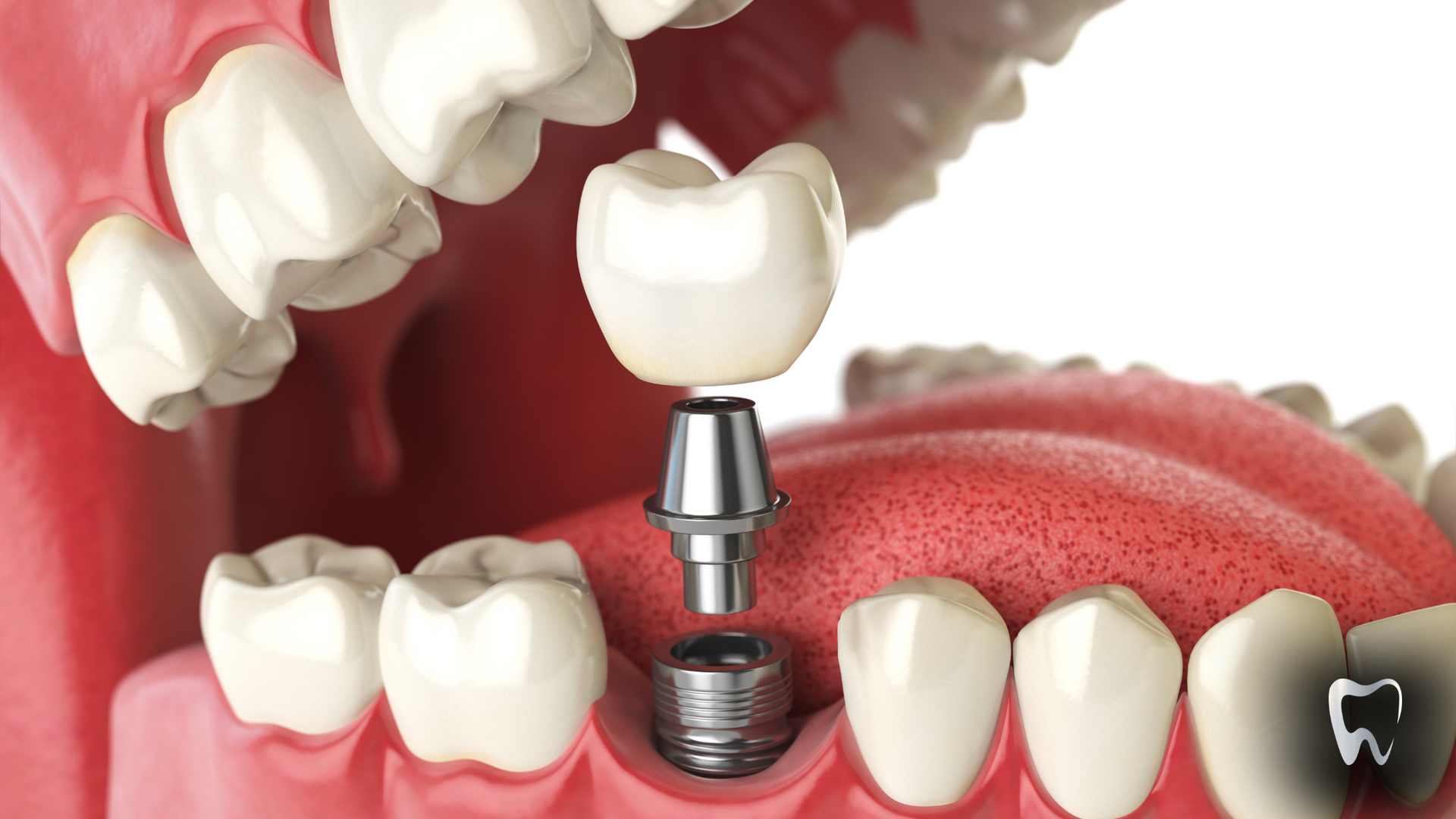
Primarily replacements for missing natural teeth, these are metal anchors, mostly screw-like, inserted surgically by preparing a ‘hole’ in the jaw bone underneath the gums. Dental implants functionally substitute the root part of the teeth. A metal or ceramic tooth-shaped structure replaces the routinely visible part of teeth known as the crown. Crowns and implants jointly perform as a unit, transferring the chewing loads into the bone. Dentists either glue the crowns to the implant superstructure or tighten them with an intermediate screw.
Initial stability is a prerequisite for the smooth functioning of an implant. In people with inadequate initial stability, an experienced implant dentist may prefer to bury the implant under the gums for healing, which can take 4 to 6 months or more3. Only after an adequate healing period and comprehensive evaluation will the dentist proceed with the attachment of the crown part.
What Are Dental Implants Made Of?
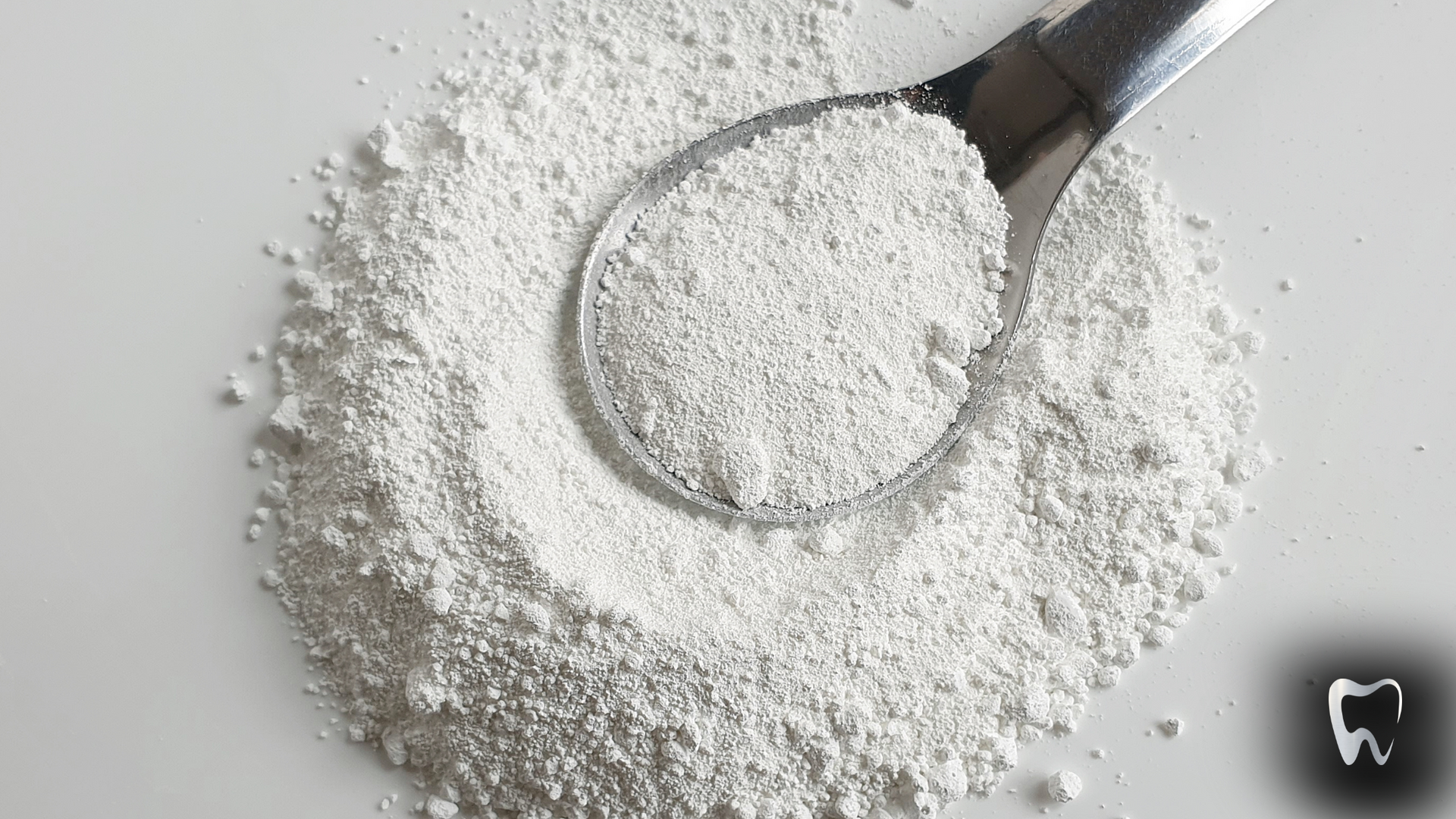
Titanium or zirconium oxide, ceramics, polymers, metals, carbon, and combinations of these are common biomaterials in modern-day dental implants. Polymers are relatively softer and more flexible. However, contemporary dental implants are made of titanium and alloy with aluminium and vanadium. Commercially pure titanium is excellently biocompatible, highly stiff, and resistant to corrosion.
How Do Dental Implants Work?
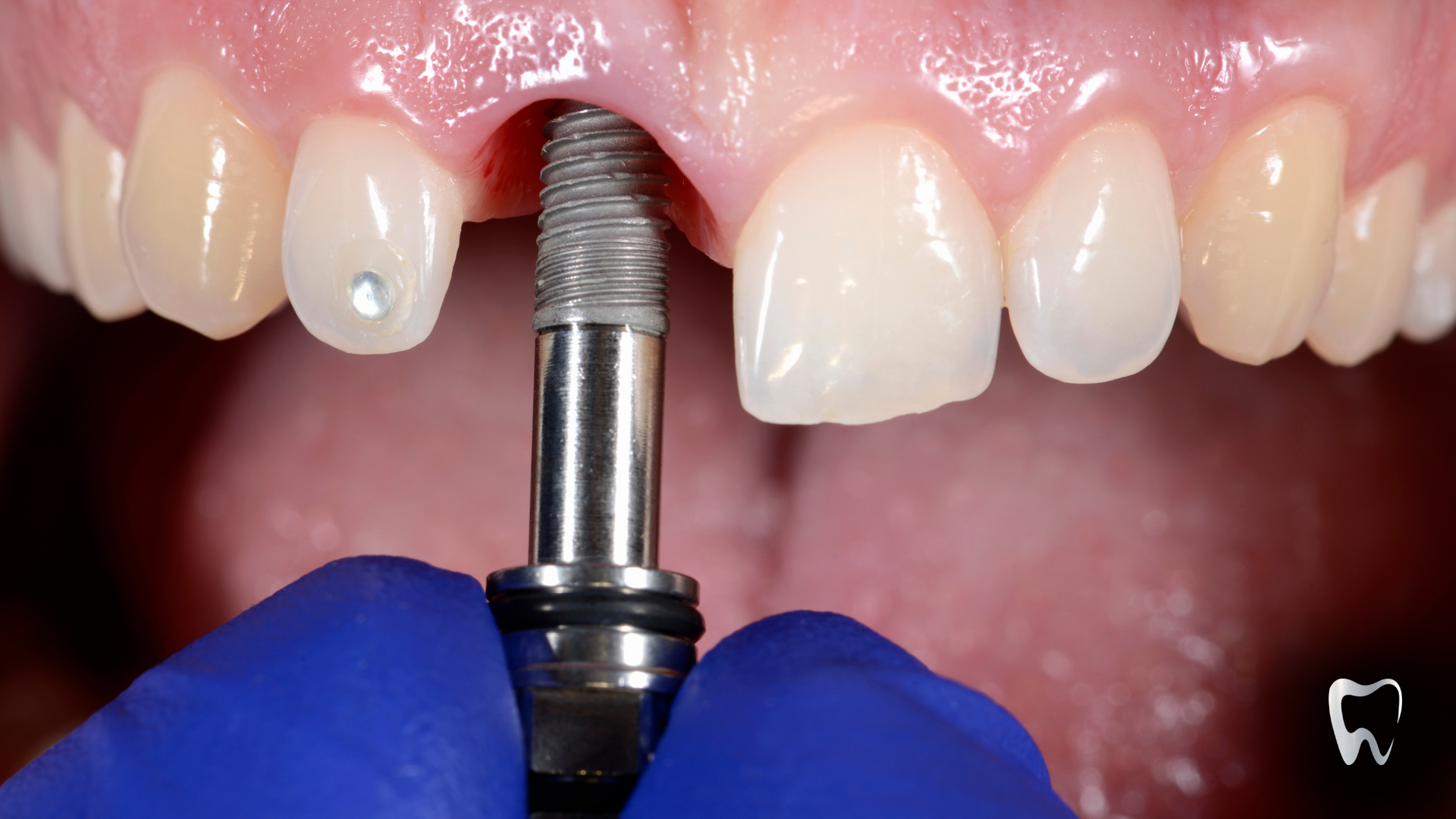
Tooth roots typically have two major functions: providing an anchor to the tooth and preserving the adjacent bone. Dental implants act as tooth roots and provide an anchor to the tooth crown in the jawbone. They also preserve the bone surrounding the dental implant.
As the dentist places a dental implant in the jawbone, the oxide layer forms over the exposed surface, which is in close contact with the adjacent bone. Once the oxide layer forms over the surface, it acts like a dynamic interface and a scaffold for bone deposition. Eventually, it provides a mechanical interlocking between bone and threads of the implant surface. Once the jaw bone integrates with the implant surface, they are ready to work like tooth roots.
What Is The Procedure For Dental Implants?
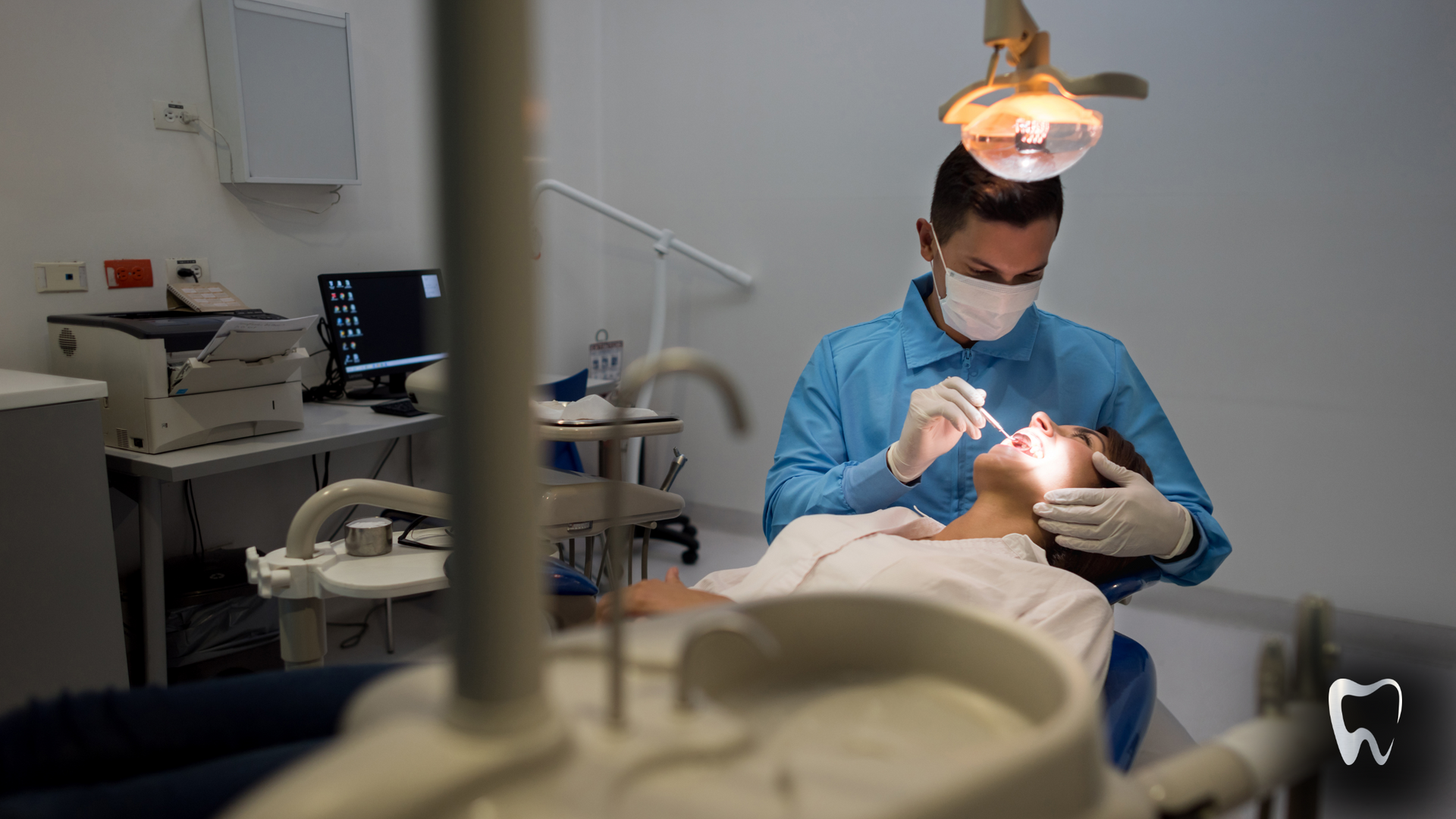
Dental implants are a replacement for natural teeth, and dentists trained in their placement perform surgery on the jaw bone. The placement of a dental implant can generally be categorized into two types: placing the implant in an extraction socket (the bony housing where the tooth root was) and placing the implant in an already healed jawbone. Irrespective of the above, a few steps of the procedure for dental implants, as mentioned below, remain common.
- Assessment of the jawbone available and space for a replacement tooth crown.
- Profound administration of local anesthesia.
- Gaining access to the underlying bone (with a tissue punch or surgically cutting the gums).
- Preparing the bone using twist drills that can receive the optimum size dental implant under copious irrigation with coolant.
- Place the dental implant as per the plan, and close the surgical site with suitable stitches.
Once the implants are installed in the jaw, movement must be minimized to ensure proper healing.
What To Expect After Dental Implant Surgery

The after-effects of a dental implant surgery depend on several factors like jawbone quality and quantity, implant type, achieved stability, chewing forces, and bone loss around the implant.
Dense bone quality with adequate bone dimensions is important for:
- holding the dental implant firmly in its place,
- long-term subsistence and
- uneventful healing after implant placement4.
Sometimes, chewing forces are blamed for bone loss around dental implants. Adjusting the surfaces of dental implant crowns to reduce heavy chewing forces has shown favorable results. Studies indicate a reduction in bone loss around dental implants after these adjustments. However, if bone loss continues, one can expect the dental implant to fail. The aftermath of failing or failed implants has to be dealt with accordingly5.
Consequences One Can Expect After a Dental Implant Surgery

Immediate Aftercare
- Post-Surgery Discomfort: It is normal to experience some swelling, bruising, pain, and minor bleeding after surgery. Your dentist may prescribe pain relievers and antibiotics to manage discomfort and prevent infection.
- Dietary Restrictions: Stick to soft foods and avoid chewing on the implant site. Gradually reintroduce solid foods as the healing progresses.
Healing Process
- Initial Healing: The initial healing phase typically lasts a few weeks. During this time, it is crucial to follow your dentist’s instructions, including avoiding strenuous activities that could disrupt the healing process.
- Osseointegration: Over the next few months, the implant will fuse with your jawbone via a process called osseointegration. This is essential for the implant’s stability and success.

Oral Hygiene
- Careful Cleaning: Maintain good oral hygiene by gently brushing and flossing around the implant site. Your dentist might recommend a special mouthwash to keep the area clean.
- Regular Check-Ups: Attend all scheduled follow-up appointments to ensure the implant is healing properly and to address any concerns.
Potential Issues
- Signs of Complications: Watch for signs of infection, prolonged pain, or implant movement. Contact your dentist immediately if you experience any of these symptoms.
- Long-Term Maintenance: Once the implant has fully integrated, continue regular dental visits and maintain good oral hygiene to ensure the longevity of your implant.
Final Restoration
- Attaching the Crown: After the implant has fully healed and integrated with the bone, your dentist will attach the permanent crown. This process usually involves several fittings to ensure a perfect match.
Are Dental Implants Safe?

Yes, modern-day dental implants made with titanium are proven safe and effective based on studies involving a large number of patients. Also, implant surgery and the local anesthetic agents appear to be safe procedures even in medically ill patients.
Can Dental Implants Be Removed?
Yes, dentists trained in oral implantology can remove dental implants. Dental implants may need to be removed if they become loose or cause the patient pain. Removal is also necessary if an infection develops or if more than 50% of the jawbone is lost, as seen in radiographs.
Professional Care For Optimal Oral Health

Achieving a successful clinical outcome for dental implants is crucial for both patients and dentists from a quality-of-life perspective. Consequently, studies with 20 years of follow-up are significant and a testimony to the survival rates of the implant.
Professional care and advice are crucial for dental implants to ensure proper placement, reduce the risk of complications, and enhance long-term success. Regular dental check-ups help monitor the implant’s health, address issues early, and maintain overall oral hygiene. At Rockwest Dental Clinic Mississauga, we offer expert dental services while ensuring you have a comforting and relaxing experience. Contact us today for professional dental advice and services.
References
- Jemt, T. (2016). Single-Implant Survival: More Than 30 Years of Clinical Experience. The International Journal of Prosthodontics, 551–558. doi:10.11607/ijp.4892
- Albrektsson T, Zarb G, Worthington P, Eriksson AR. The long-term efficacy of currently used dental implants: a review and proposed criteria of success. Int j oral maxillofac implants. 1986 Jan 1;1(1):11-25.
- Oshida Y, Tuna EB, Aktören O, Gençay K. Dental implant systems. International journal of molecular sciences. 2010 Apr;11(4):1580-678.
- Hiranmayi VK. Factors influencing implant stability. Journal of Dental Implants. 2018 Jul 1;8(2):69-76.
- Graves, C. V., Harrel, S. K., Rossmann, J. A., Kerns, D., Gonzalez, J. A., Kontogiorgos, E. D., Al-Hashimi, I., & Abraham, C. (2016). The Role of Occlusion in the Dental Implant and Peri-implant Condition: A Review. The Open Dentistry Journal, 10, 594-601. https://doi.org/10.2174/1874210601610010594
The post How Long Do Dental Implants Last appeared first on Rockwest Dental Clinic Mississauga.









